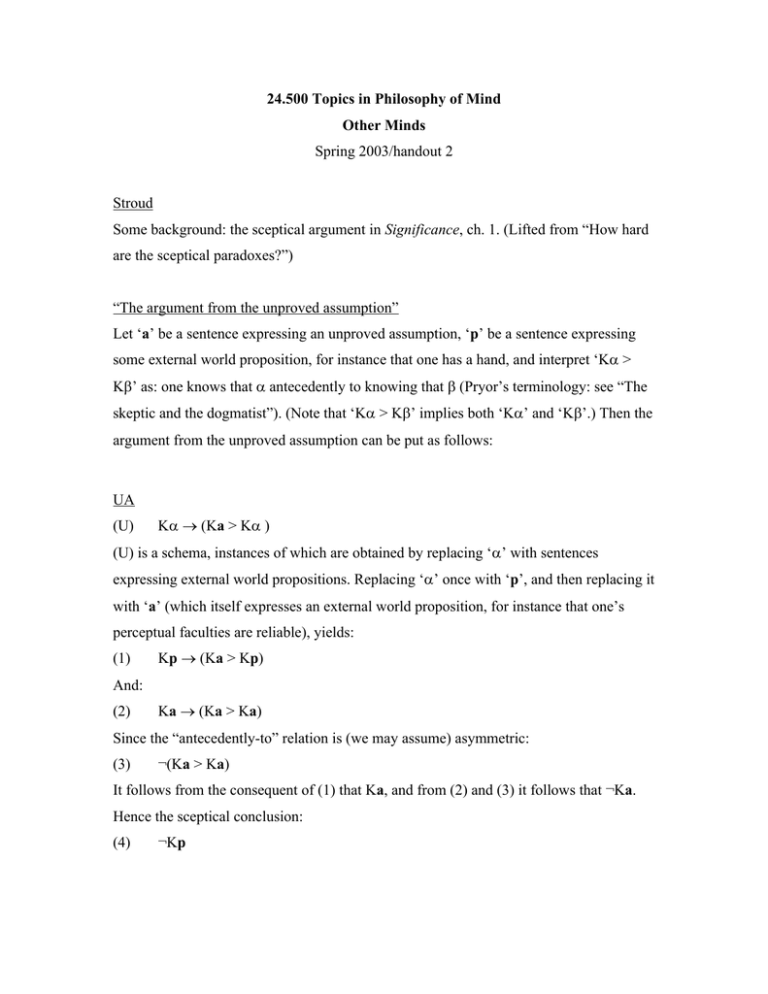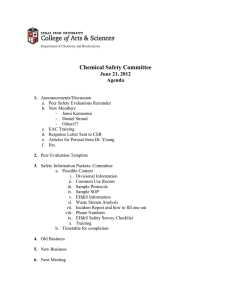Document 13521370
advertisement

24.500 Topics in Philosophy of Mind Other Minds Spring 2003/handout 2 Stroud Some background: the sceptical argument in Significance, ch. 1. (Lifted from “How hard are the sceptical paradoxes?”) “The argument from the unproved assumption” Let ‘a’ be a sentence expressing an unproved assumption, ‘p’ be a sentence expressing some external world proposition, for instance that one has a hand, and interpret ‘Kα > Kβ’ as: one knows that α antecedently to knowing that β (Pryor’s terminology: see “The skeptic and the dogmatist”). (Note that ‘Kα > Kβ’ implies both ‘Kα’ and ‘Kβ’.) Then the argument from the unproved assumption can be put as follows: UA (U) Kα → (Ka > Kα ) (U) is a schema, instances of which are obtained by replacing ‘α’ with sentences expressing external world propositions. Replacing ‘α’ once with ‘p’, and then replacing it with ‘a’ (which itself expresses an external world proposition, for instance that one’s perceptual faculties are reliable), yields: (1) Kp → (Ka > Kp) And: (2) Ka → (Ka > Ka) Since the “antecedently-to” relation is (we may assume) asymmetric: (3) ¬(Ka > Ka) It follows from the consequent of (1) that Ka, and from (2) and (3) it follows that ¬Ka. Hence the sceptical conclusion: (4) ¬Kp 2 An example: I cannot acquire sufficient reason to believe that I am not dreaming…by any empirical procedure. For before carrying out an empirical procedure can give me reason to believe something, I need to have sufficient reason to believe that it has been properly carried out, a fortiori that it has been carrried out at all. And I can have sufficient reason to believe that only if I have sufficient reason to believe that I did not dream its execution. So empirically based reason to believe that I am not dreaming is excluded. Since the proposition seems quite unsuitable to be reasonably believed by me a priori, I cannot, the sceptic will contend, acquire sufficient reason to believe it at all. (Wright, “Facts and Certainty”, first emphasis mine.) Letting ‘d’ express the proposition that one is dreaming, the schema in the Stroudian version of UA is: (U*) Kα → (K¬d > Kα ) Following Stroud, call the claim that every “external world” instance of (U*) is true, Descartes’ Condition. We may concede that once we accept Descartes’ Condition, the game is over. But why should we accept it? According to Stroud, it appears to be an instance of a more general principle that we accept in everyday life: Given our original favourable response to Descartes’s reasoning, then, it can scarcely be denied that what I have called his assumption or condition seems perfectly natural to insist on. Perhaps it seems like nothing more that an insistence of a familiar commonplace about knowledge. We are all aware that, even in the most ordinary circumstances when nothing very important turns on the outcome, we cannot know a particular thing unless we have ruled out certain possibilities that we recognize are incompatible with our knowing that thing. (Significance, 24, my emphasis). 3 Note that the italicized claim should be read as: we cannot know a particular thing unless we have antecedently ruled out possibilities that we recognize are incompatible with our knowing that thing. And later Stroud mentions another possibility for the general principle of which Descartes’ Condition is an instance: Reflecting even on the uncontroversial everyday examples alone can easily lead us to suppose that [the general principle] is something like this: if somebody knows something, p, he must know the falsity of all those things incompatible with his knowing that p (or perhaps all those things he knows to be incompatible with his knowing that p). (29-30, my italics) Again, for explicitness the word ‘antecedently’ should be inserted before ‘know’ in the italicized part. The first quotation (and the parenthetical part of the second) suggests the following schematic principle (where ‘α’ and ‘β’ may be replaced with any sentences expressing external world propositions): (A) [Kα & K(Kα → β)] → (Kβ > Kα) And the second quotation suggests an alternative: (B) [Kα & (Kα → β)] → (Kβ > Kα) Note that, because ‘K(Kα → β)’ implies ‘Kα → β’, the antecedent of (A) is equivalent to the antecedent of (B) plus the conjunct ‘K(Kα → β)’, and so (by the principle of “strengthening the antecedent”) (B) implies (A). We may therefore exclusively consider (A), since the weaker the principle, the stronger the sceptic’s case. Assuming (reasonably enough, at least for knowers like ourselves) that one does know that if one knows some external world proposition p, then one is not dreaming, then an instance of (A), replacing ‘β’ with ‘¬d’, gives us Descartes’ Condition. (Note that sceptical consequences can be drawn from (A) more quickly: replacing ‘α’ and ‘β’ both with ‘p’ and assuming that K(Kp → p), gives us that ¬Kp, because ¬(Kp > Kp).) 4 Sceptical consequences aside, (A) is not very appealing. Replacing ‘β’ with ‘Kp’, and assuming that K(Kp → Kp), we get the “KK” principle: Kα → KKα (see, in particular, Williamson on this). And what’s even worse, (A) implies that if one knows p, one knows that one knows p antecedently to knowing p! That just cannot be right.. An alternative (less interesting) exegesis of Stroud’s sceptical argument: Principle (A´) (cf. the previous quotations from Stroud): if one knows that α and knows that one’s knowing that α is incompatible with it’s being false that β, then one knows that β: (A´) [Kα & K(Kα → β)] → Kβ Hence: (1) [Kp & K(Kp → ¬d)] → K¬d (2) ¬K¬d [Premise] (3) ¬[Kp & K(Kp → ¬d)] [From (1), (2)] (4) K(Kp → ¬d) [Premise] (5) ¬Kp [From (3), (4)] Stroud against Austin Austin is read as (in effect) claiming that the sceptic “imposes on knowledge an unreasonable or outrageous requirement” (41), or (a completely different thought), “violating or rejecting the everyday meaning of the word ‘know’ (57). “Austin thought that an inquiry into the sources of the sceptical conclusion as ‘a matter of picking, one by one a mass of seductive (mainly verbal) fallacies…” (42). Austin’s remark is about the sense datum theory, not about scepticism. So the quote suggests that Stroud himself thinks (or, at any rate, thought—he certainly doesn’t think it now) that scepticism is driven by the sense datum theory. See also the para on 43-4 about Closure which, in conjunction with n.4, suggests that Austin thinks we don’t know that other people aren’t zombies (that we aren’t brains in vats, etc). This is potentially confusing because of Stroud’s use of the “dreaming hypothesis”, which is not incompatible with one’s having hands, etc. 5 One dialectical complication is that Austin is not (or not straightforwardly), replying to a sceptical argument (as it might be, an Other Minds version of the sceptical argument in Stroud’s ch. 1.) Still less is Austin trying to prove, using only premises that the sceptic would accept, that the sceptical conclusion is false. It’s clear from the last few paragraphs that Austin think that there is no “‘justification’…for supposing that there is another mind communicating with you at all”. At any rate, Stroud’s main complaint about Austin is that “it is possible for a perfectly meaningful expression to be appropriately and justifiably applied in paradigm situations and for its negation to be equally appropriately and justifiably applied in others, even though what is said in each of the positive applications is never true” (73), which he supports with Clarke’s example of the aircraft spotters. And so (well, maybe) Stroud thinks that Austin is trying to show that we (I) do know that there are other minds, on the basis of certain facts about English usage. (Since the relevant “facts about English usage” presuppose the existence of other minds, they would be certainly be disputed by a sceptic. Hence the whole strategy seems forlorn in any event.) What are ‘appropriately and justifiably’ supposed to mean? Note 12 suggests that this is a Gricean idea: the norms governing conversation sometimes prohibit uttering truths (“Glanzberg is either in the pub or the library”, “The pillar box looks red”, etc.), and mandate uttering falsehoods (“He’s six feet tall”, “Everything on the menu is overpriced”, (more controversially) “There’s no beer”, etc.). But the spotters example doesn’t seem to be a case of this sort (the spotters are ignorant of a crucial fact). In fact, since there appears to be a disanalogy between the spotters case and our own (namely, there’s no corresponding crucial fact in our case), the example might be of better use to the anti-sceptic.
